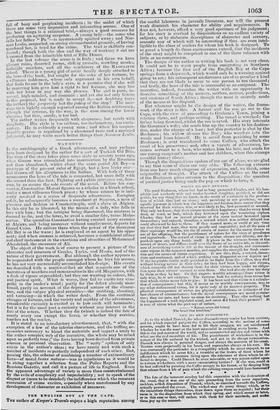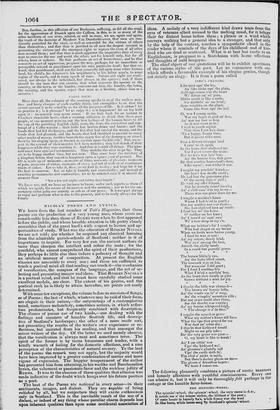THE ENGLISH BOY AT THE CAPE.
THE author of Keeper's Travels enjoys a high reputation among the useful labourers in juvenile literature, nor will the present work diminish his character for ability and acquirements. It dues not, however, afford a very good specimen of his judgment; for his story is overlaid by disquisitions on an endless variety of subjects, or by elaborate descriptions of character and scenery, scarcely any of which will be interesting if they are even intel- ligible to the class of readers for whom his book is designed. To so great a length do these excrescences extend, that the incidents of the story might be comprised in one of the three volumes with little or no compression.
The design of the author in writing his book is not very clear. It could not be to warn people from emigrating to Southern Africa ; because the first evil of the English Boy at the Cape springs from a shipwreck, which would only be a warning against going to sea; his subsequent misfortunes are of so peculiar a kind that they are not likely to occur to one person in ten thousand; and lastly, the hero of the tale is successful as an emigrant. The narrative, indeed, furnishes the writer with an opportunity to describe something of the scenery, settlers, natives, productions, and customs of South Africa ; though the most is scarcely made of the means at his disposal.
But whatever might be the design of the writer, the frame. work of the story is this. A farmer and his son go out to the Cape, with the view of proceeding to Graham's Town, joining a relation there, and perhaps settling. The vessel is wrecked; the father being drowned, whilst the son is saved. His story interests the Governor's wife; she sends him up the country to his destina- tion, under the charge of a boor; but this protector is shot by the Bushmen ; his widow ill-uses the Boy ; who wanders into the woods and loses himself. He is saved from perishing by some Bushmen; is next transferred to some Collies, who attack the creel of his preservers; and, after a variety of adventures, be- comes servant to a boor, who makes him his heir, and sends for our young emigrant's mother and her children, when this strange eventful history closes. Though the disquisitions spoken of are out of place, we are glad to say that some of them are very able. The following extracts
from one have much elegance of expression, and, we think, some originality of thought. The attack of the Celtics on the creel of the Bushmen gives occasion to the disquisition ; the question of poetical justice being made the peg on which to hang it.
VIRTUE ITS OWN REWARD.
The good Bushman, whose hut had so long protected Charles, and his hos- pitable and motherly wife and tender-bearted daughter, perished, or did not perish, for any thing that we know, in the result of a calamity in the produc- tion of which they had no share; and, perishing or not perishing, we are equally ignorant in which way the happiness and freedom from sorrow that they deserved for their virtues, was, or was likely to be, best promoted or secured. This only we know, that their virtues were their happiness; that for every kind deed, or word, or look, which they bestowed upon the wandering orphan Charles, they had an inward pleasure at the same instant bestowed upon themselves ; and enjoyed, therefore, a reward which was neither delayed nor could afterward be lost to them. If they wanted more, or could at any time say that they had none, they were gteedy and ungrateful ; and all the pain of their repinings would be, not the ill return of nature for the mercy shown to one of her offspring, but the punishment of nature for the vices of greediness and ingratitude. The reward of virtue is neither chance nor dilatory, nor de.. pendent upon any thing beside itself. It glows in the virtuous bosom at the instant of desert, and diffuses itself over the frame of an entire life, as the cool- ness of revivifying water is felt at the instant of the draught, and communi. cates vigour to the remotest member, and supplies the strength for fresh exer- tion and the means of future acquisition. Is not this, then, a reward, imme- diate and continued, and of which nothing can disappoint us nor deprive us? If the hospitable family really perished in its flight from the Caffres, they died without leaving nature in their debt; for they had been happy, and nature, which assuredly did not destroy them for their virtues, was under no obliga- tion upon their virtues' account to save them. She had already done her duty by them as they by her. lie that expects worldly advantages from virtue is only wise, he is not vittuous. The virtuous look for nothing front virtue but that which virtue never fails to give. It has been said that virtue is a calcula- tion of consequences ; but this, if meant as to worldly cowequences, was to say what dishonoured virtue, for it spoke only of its meanest property. The physical consequences of virtue are physical calculations, or estimates of the best chance of circumstances; but the moral consequences are moral certain- ties; they are sure, and leave no room for doubting. They offer nothing but the happiness of a well- regulated mind, and never did break their promise! It is true of virtue what the poet says of nature, - " Nature never did betray
The heart that loved her."
VICE ITS OWN PUNISHMENT.
As to the wicked Dassiek, for whose discomfit every reader has been anxious, and for which especial purpose the Caffres, according to the notions of some persons, ought to have been led to lift their assagays, we are uninformed whether he was the most or the least successful in avoiding every harm. And this is the real course of the world, and so unconnected are vice and virtue with what are the real casualties of life. The punishment of wickedness is in the nature of the life endured by the wicked, and not in its abrupt termination. Dassick was always in personal danger, and always the aversion of his creel. Terrors were perpetually in his heart, and reproaches always in his ears. He was continually the pretender to a tranquillity which he never enjoyed, to an indifference which he never felt ; a trembler at the frown of those whom he affected to scorn; a creature living upon the tolerance of those whom he af- fected to despise. Could Dassick be more miserable, or was nature called upon to torture wickedness with a more excruciating torture? If she was, could it he best inflicted by pointing the Caffre assagay to his breast, or by denying him that release from a life of pain which the calming weapon would have bestowed?
• • • • •
The fate of the innocent monkey had this connexion with the destruction of the craal, that it was one of the acts proceeding from the same rapacious, reckless, selfish disposition of Dassick, which, as exercised towards the Caffres, actually provoked the event. The wicked may do many things which, as to the immediate things themselves, draw down upon them no requital ; but their curse is in the disposition from which they spring, and which sooner or later, or in this case or that, will reckon with them for their misdeeds, and make them pay up the amount.
But, further, in this affliction of our Bushmen, suffering, as did all the craal, for the aggressions of Dassick upon the Caffres, in this, as in so many of the other incidents of our story, related, or still in store, we see, again and again, the truth of the doctrine of Mynheer Van Dunderblouwer, that men are con- tinually punished for the vices, as well as rewarded for the virtues of others than themselves ; and that thus is justified in all men the deepest interest in promoting the virtues and the strongest right to repress the vices of all other men around them ; and that thus is made apparent the imperative duty of every
man to exercise the one and avoid the other, not for himself only, but for all others, born or unborn. He that performs an act of benevolence, and he that commits an act of oppression, prepares the way, perhaps, for no immediate or perceptible reward or punishment upon his own particular head ; but that re- ward, that punishment, shall not the less assuredly fall upon some other human head, his child's, his kinsman's, his neighbour's, or his fellow man's, in sonic region of the earth, and in some epoch of time. Nature and right are vindi- cated, not always in the individual, but always in the species; and, if there should be any man that can answer, that what concerns the species or the country, or the town, or the hamlet, concerns not him, the hamlet, the town, the country, and the species, reject that man as a brother, abhor him as a monster !
CARPE DIEM.
More than all, the calamity of the morning speaks to Us of the endless mix- ture and hasty changes of each earthly thing, and exemplifies to us that the actual amount is to be seized by us for all the purposes of life. Is it virtue? let us practise it ; is it pleasure? let us enjoy it ; is it happiness? let us lay hold upon it : to-morrow may never Caine. If we look back for an instant to Charles's chatitable hosts, what a seeming affliction to think that those poor people, at one moment pouring out the best feelings of the human heart to fill the cup of the perishing English child, were, the next, the execration and con- tempt of a Catfre warrior ; their little hut broken down and burnt ; and the hands that had fed the hungry, and the feet that hail carried the weary, and the heads that had planned, and the hearts that bad throbbed to execute so many other works of mercy, trodden beneath the angry feet of the destroyer, or struck down by his singing spear, or thrown as carrion upon the hill-side! But, we re- peat it, the reward of their mercies hal been mercies ; they had drunk of their happiness while they were meriting it. And thus it is with all things. The igno- rant must have ages and not momeuts. They wait for the river to go by. They are to be happy another time, but not now. They must have the territory of a kingdom before they can it in happiness upon a squaw yard of ground. But life is made up of moments—moments of time, moments of pleasure, moments of pain, moments of virtue, moments of vice ; and not of wide or of continuous tracts of either. Let us take it, then, as we find it, to-day; and hope for it for the best to-morrow. Let us take it humbly and contentedly ; and instead of exacting permanencies and continuities, let us be satisfied even if it should do no more than "Yet a few soft nights and balmy days impart."
We know not, and we have no business to know, under such aspects as those of which we speak, the events of to- morrow and the morning ; nor to let the un- certainty either palsy our activity or soh us of our peace. It is our part always to enjoy and perform what is due to the present, and to be ready always for the future.



























 Previous page
Previous page